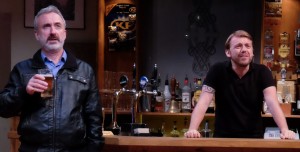Philadelphia, Here I Come, written in the 1960s by Irish playwright Brian Friel, poignantly captures the anticipation, fear, and excitement of emigrating to a new place. Set on the eve of departure, Friel’s play focuses on Gar, the would-be émigré, in both his Public self (played with subdued melancholy by David McElwee) as he struggles with his decision to leave, and his Private self (played with exuberance by A.J. Shively), screaming to get out. It’s deadly boring in Ballybeg, a tiny little corner of County Donegal, Ireland, where the most exciting things are a game of checkers and memories of teenage shenanigans.
The Mountains Look Different
Set on Midsummer’s Eve (June 23), Micheál mac Liammóir’s The Mountains Look Different is about a woman’s attempt to reinvent herself through marriage following years of working as a prostitute in London. First performed at the Gate Theater in Dublin, the noted Irish actor’s play was applauded for its openness by critics and audiences in 1948, but it was also disdained by the God-fearing and narrow-minded Catholic community. However bold it was then, by today’s standards director Aidan Redmond’s revival offers audiences little more than a diorama, a 3-D representation of a bygone era.
Feathered Enemies
The Birds, Conor McPherson’s creepy new play, is derived neither from Aristophanes nor Alfred Hitchcock. It does, however, share DNA with the 1963 film because both draw from a short story by Daphne du Maurier. (Hitchcock also used du Maurier novels as source material for Jamaica Inn and his Oscar-winning Rebecca.) Don’t expect to find real birds or even simulated ones in the pocket drama at 59E59 Theaters. Fans of the movie won’t find a pompous female ornithologist with environmental concerns or a schoolteacher with her eyes pecked out either.
Wounds That Won’t Heal
The works of Northern Ireland playwright Owen McCafferty may be unfamiliar to regular theatergoers in America, but since the early years of this century he has been building an important body of work—a visit to London in 2002 brought this writer in contact with Closing Time, an early play with the inestimable Jim Norton. Hosting a production from the Abbey Theater of McCafferty’s Quietly, the Irish Rep is doing a service by introducing the playwright, even if the work at hand has its drawbacks.
The acting isn’t one of them. From the moment he enters, the shaved-headed Patrick O’Kane’s Jimmy is clearly a “hard man,” one that you wouldn’t want to face down in a bar, where McCafferty has set his story of confrontation and reckoning. Jimmy is tense, simmering with anger and radiating danger as he offers the bartender, Robert (Robert Zawadzki), his services in running off wild young teens gathering nearby. It’s the night of a soccer match between Poland and Northern Ireland—the play is set in Belfast in 2009—and Poland is Robert’s native country. “Do you want me to go out and get rid of them?” Jimmy asks, and Robert answers, “They’re only kids.” Jimmy responds, “Kids can do more damage than you think”—a deft foreshadowing of what’s to come.
Jimmy Fay’s production is splendidly designed by Alyson Cummins, though perhaps a bit too gleaming to be a rundown pub, improbably empty on the night of a major soccer showdown. Except for Jimmy, Robert, and the Ian of Declan Conlon—clad in a black leather jacket and no less imposing than Jimmy, even with a graying beard—nobody is in the bar watching the television match.
The connection between Jimmy and Ian goes back to their boyhoods, and one instinctively knows—and it’s shortly apparent—that their enmity dates from “the Troubles” and the height of civil strife between Protestants and Catholics in Northern Ireland in the 1970s.
McCafferty’s play focuses on the wrongs each side perpetrated on the other during the 1960s and ’70s—particularly in that same pub, on a night in 1974 when Poland also played Northern Ireland (a little too conveniently, perhaps)—and the damage inflicted on the country’s children, as well as the necessity of letting go of the past. McCafferty’s plot may be particular to that conflict, but his template is familiar from dozens of other plays. Nor, indeed, after an early moment of sudden violence, does one expect any more, for the longer the men talk, the clearer it becomes that there’s dirty laundry to be aired but that some form of nonviolent resolution will take place rather than more blood spilled.
Jimmy’s anger dates from a bombing in the same Belfast bar on a crucial night in 1974. Six men were killed, one of them Jimmy’s father, but the repercussions have scarred both Ian and Jimmy. The talking that ensues, fueled by alcohol, of course, peels back layer upon layer of each man’s history, and Fay punctuates the dialogue with long, awkward silences that thicken the atmosphere with tension.
Still, it’s hard not to feel that the story may carry more weight for McCafferty and an Irish audience that it does for a foreign one that didn’t experience the strife decades ago. The analogous situation might be for a New Yorker and a bin Laden follower involved in 9/11 to meet in a bar, with the lesson that both must let go of the past, but that’s not likely, and there’s a whiff of unearned optimism in the ability of these men to abandon revenge in lieu of understanding. Still, McCafferty settles on a note of ambiguity to end Quietly, a moment that deftly suggests danger is unpredictable and never far away.
The Abbey Theatre production of Owen McCafferty’s Quietly, presented by the Irish Repertory Theatre and the Public Theater, runs through Sept. 11 at the Irish Rep (132 W. 22nd St.). Evening performances are at 7 p.m. Tuesday and Thursday and at 8 p.m. Wednesday, Friday and Saturday; matinees are at 3 p.m. Wednesday, Saturday and Sunday. Tickets may be purchased by calling OvationTix at (212) 727-2737 or visiting irishrep.org.










